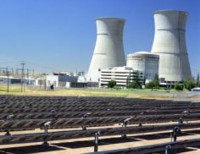Solar Power in Ontario Could Outshine All U.S. Nuclear Reactors

An EBR_EBdaily article published last month notes that solar
power in southeastern Ontario has the potential to produce almost
the same amount of power as all the nuclear reactors in the United
States. This conclusion is based on two studies conducted by the
Queen’s University Applied Sustainability Research Group located in
Kingston, Canada.
These studies, led by Queen’s mechanical engineering professor
Joshua Pearce, are the first to explore the region’s solar energy
potential. Professor Pearce was surprised by how many gigawatts
could be produced.
“We came up with enormous numbers and we were being
conservative. There about 95 gigawatts of potential power just in
southeastern Ontario - that shows there is massive potential,” says
Professor Pearce, who specializes in solar photovoltaic materials
and applied sustainability.
One study, accepted for publication in the journal Computers,
Environment and Urban Systems, discovered that if choice roof tops
in southeastern Ontario were covered with solar panels, they could
produce five gigawatts, or about five per cent of all of Ontario’s
energy. The study took into account roof orientation and
shading.
“To put this in perspective, all the coal plants in
all of Ontario produce just over six gigawatts. The sun doesn’t
always shine, so if you couple solar power with other renewable
energy sources such as wind, hydro and biomass, southeastern
Ontario could easily cover its own energy needs,” Professor Pearce
says.
A second study, published in May issue of the journal Solar
Energy, looked at land in southeastern Ontario that could be used
for solar farms. The study considered land with little economic
value - barren, rocky, non-farmable areas near electrical grids -
and concluded it has the potential to produce 90 gigawatts.
“Nuclear power for all of the United States is about 100
gigawatts. We can produce 90 on barren land with just solar in this
tiny region, so we are not talking about small potatoes,” Professor
Pearce says.
The professor conducted the studies to provide policy makers
solid numbers on solar energy potential, as well as find possible
solar farm locations for developers.
Also contributing to the studies were Queen’s civil engineering
student Lindsay Wiginton and mechanical engineering student Ha
Nguyen.

